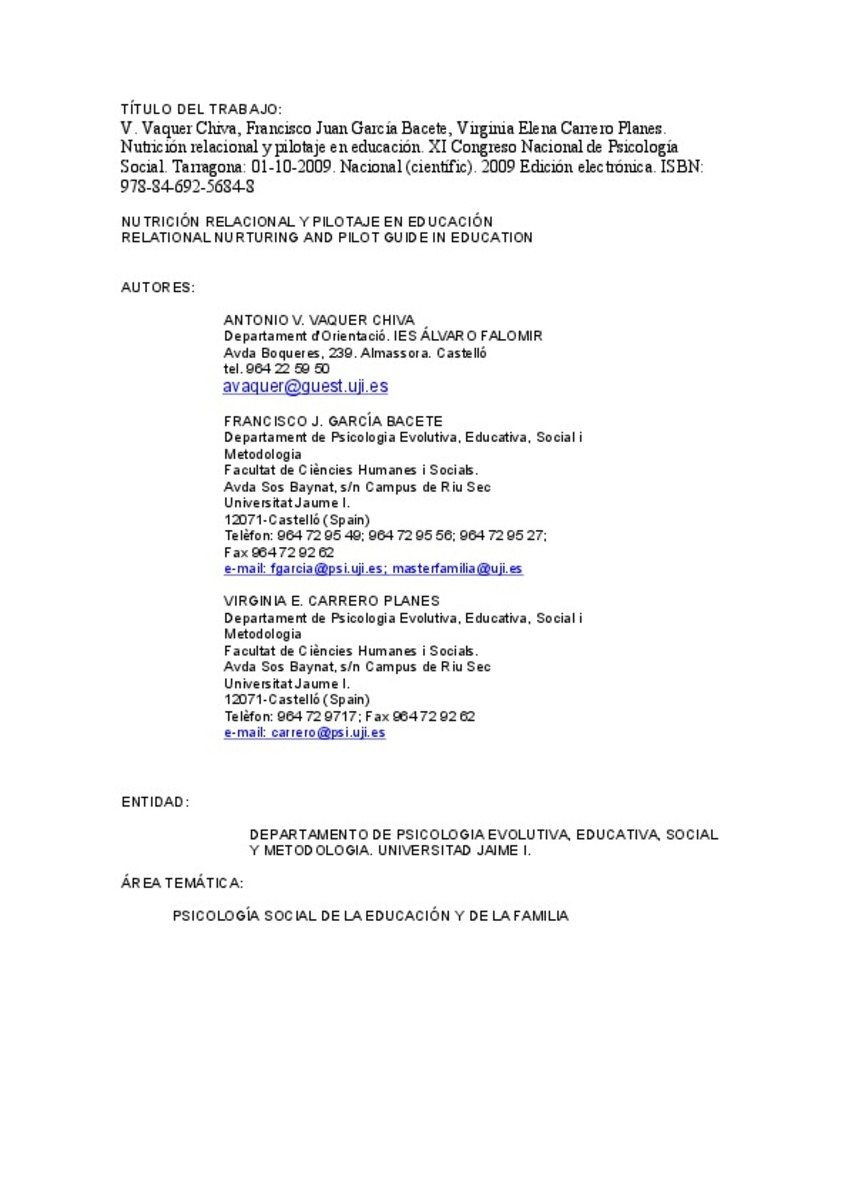Mostrar el registro sencillo del ítem
Nutrición relacional y pilotaje en educación
| dc.contributor.author | Vaquer Chiva, Antoni | |
| dc.contributor.author | García Bacete, Francisco Juan | |
| dc.contributor.author | Carrero Planes, Virginia | |
| dc.date.accessioned | 2017-10-24T06:41:56Z | |
| dc.date.available | 2017-10-24T06:41:56Z | |
| dc.date.issued | 2009-10 | |
| dc.identifier.citation | VAQUER CHIVA, Antoni; GARCÍA BACETE, Francisco Juan; CARRERO PLANES, Virginia (2009). Nutrición relacional y pilotaje en educación. Actas del XI Congreso Nacional de Psicología Social. Tarragona: 1-3 de octubre de 2009. Edición electrónica. ISBN: 978-84-692-5684-8 | ca_CA |
| dc.identifier.isbn | 978-84-692-5684-8 | |
| dc.identifier.uri | http://hdl.handle.net/10234/169490 | |
| dc.description | XI Congreso Nacional de Psicología Social (Tarragona: 1-3 de octubre de 2009) | |
| dc.description.abstract | Educational institutions are youngsters' socialization and development major frame in Spain. Concern for some disruptive fenomena that take place within the educative frame draws the attention towards investigating the educative relation’s aspects that help in a positive way the student’s learning and development. From a design of qualitative investigation, following the criteria of theorical sampling suggested at the methodology of Grounded Theory’s qualitative analysis, twenty-four idividual iterviews to parents, teachers and high-school studends were carried out. The obtained results allow to propose “personal encounter” between student and teacher, with its corresponding mutual acceptation and appreciation, as a central issue that allows affective linking and guiding pilotage’s performance. These findings show the emergency of the basic social process called “relational nurturing”, that suggests personal and educative growing process require an affective support and an instruction guide. The teachers guiding pilotage’s function, individual as well as collective in the class, shape the educative relation’s nucleus and helps relational nurturing’s process, impelling the student’s full grow-up. | ca_CA |
| dc.description.abstract | Los centros educativos constituyen el marco preferente de socialización y desarrollo de los adolescentes en España. La preocupación por algunos fenómenos disruptivos que se producen en el marco educativo dirige la atención a investigar los aspectos de la relación educativa que contribuyen de forma positiva al desarrollo y aprendizaje del alumnado. A partir de un diseño de investigación cualitativa, siguiendo los criterios de muestreo teórico propuestos en la metodología de análisis cualitativo del “Grounded Theory”, se realizaron veinticuatro entrevistas individuales a padres/madres, profesorado y alumnado de secundaria. Los resultados obtenidos permiten proponer el “encuentro” entre alumno y profesor, con su correspondiente aceptación y reconocimiento mutuo, como factor central que permite la vinculación afectiva y el ejercicio del pilotaje. Estos hallazgos muestran la emergencia del proceso social básico denominado “nutrición relacional” que sugiere que el proceso de crecimiento personal y educativo requieren de un apoyo afectivo y de una guía de instrucción. La función del pilotaje del profesor, tanto individual como de aula, conforma el centro de la relación educativa y contribuye al proceso de nutrición relacional impulsando el crecimiento pleno del alumnado. | ca_CA |
| dc.format.extent | 6 p. | ca_CA |
| dc.format.mimetype | application/pdf | ca_CA |
| dc.language.iso | spa | ca_CA |
| dc.publisher | Universitat Rovira i Virgili | ca_CA |
| dc.rights.uri | http://rightsstatements.org/vocab/CNE/1.0/ | * |
| dc.subject | Personal encounter | ca_CA |
| dc.subject | RelationaL nurturing | ca_CA |
| dc.subject | Guidance Piloting | ca_CA |
| dc.subject | Affective Linking | ca_CA |
| dc.subject | Encuentro | ca_CA |
| dc.subject | Nutrición Relacional | ca_CA |
| dc.subject | Pilotaje | ca_CA |
| dc.subject | Vinculación afectiva | ca_CA |
| dc.subject | Grounded Theory | ca_CA |
| dc.title | Nutrición relacional y pilotaje en educación | ca_CA |
| dc.type | info:eu-repo/semantics/conferenceObject | ca_CA |
| dc.rights.accessRights | info:eu-repo/semantics/openAccess | ca_CA |
| dc.type.version | info:eu-repo/semantics/publishedVersion | ca_CA |







